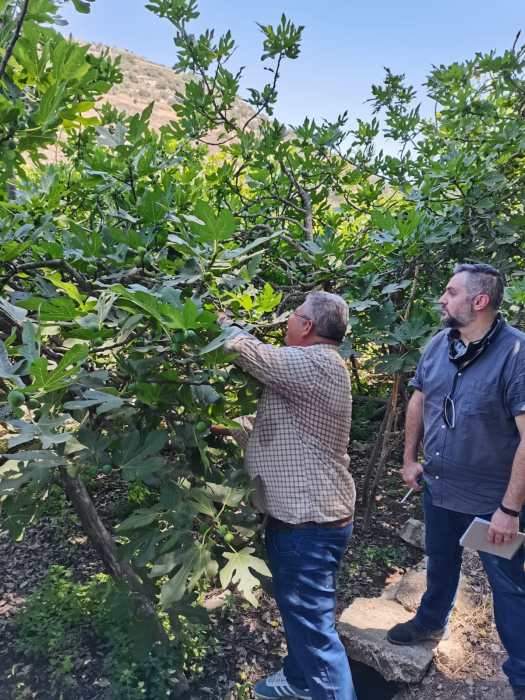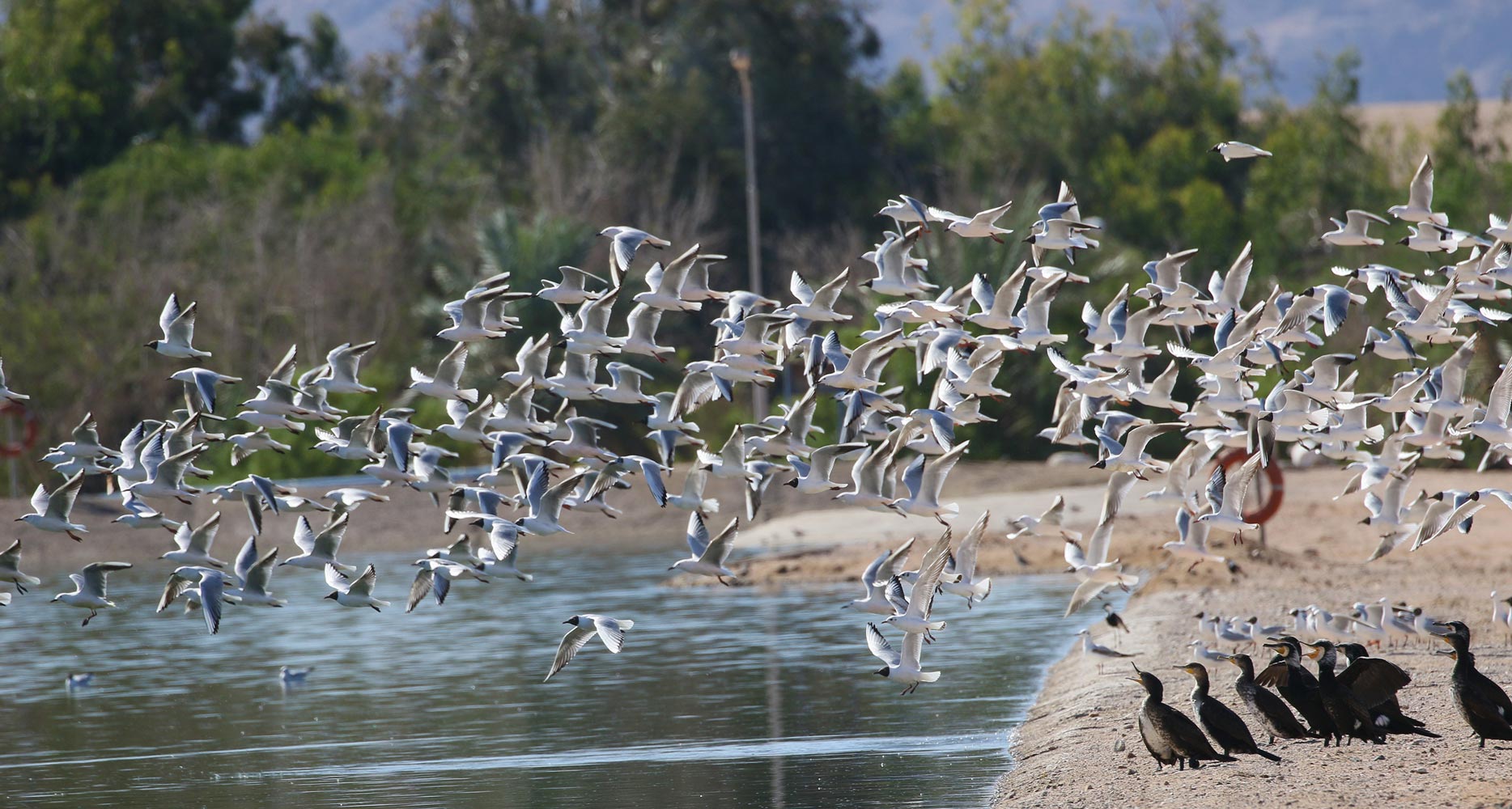at Rasun and Irjan, in the Highlands of Ajlun, Northern Jordan – a summary of activities and achievements, April 2022
Project implemented by Jordan Birdwatch (JBW) and funded by Critical Ecosystems Partnership Fund (CEPF). Duration of Project: Approximately 14 months, summer 2021 – summer 2022.
The Ajlun Highlands are part of the Mediterranean Biodiversity Hotspot, which is located in the southern Levant and it is unique for its a semi –arid to sub- humid Mediterranean climate, where the highlands support Mediterranean – type shrub lands, often dominated by evergreen oak shrubs and a flora and fauna containing endemics that are restricted to the eastern Mediterranean and Jordanian Highlands.
Ajlun is home to a wide variety of plants and animals including evergreen oak, carob, strawberry tree, Persian squirrel, golden jackal and much more. The Orjan area is located north of the city of Ajlun, and includes a small valley with a perennial stream fed by springs. These springs are vital as they provide people with all the water they require for drinking and irrigation of their plantations.
For thousands of years, this area has been inhabited by different civilizations. The land has been put to use by people for farming and herding domesticated sheep till today. The impacts of some practices along with climate change and wood cutting is causing a dramatic decline in biodiversity and the area of natural habitats.

Supporting Traditional Farming
Nowadays, traditional farming that includes orchards and small fields is still being practiced in the area. This kind of farming imposes less negative impact on the surrounding environment than extensive farming and wide-spread urbanization. In the villages of Orjan and Rasun, these small farms attract curious visitors who want a traditional hands-on farming experience. Additionally, fruits like figs and pomegranates, are often produced in abundance and the farmers strive to sell their fresh produce whether through markets or even on roadsides.
These two fruits are delightful and in high demand when fresh but they also go into the production of pantry items that are important in the Middle Eastern cuisine. However, most local farmers lack the experience to market their products and prepare and package pantry items in a suitable way for the market. Although most orchards are small and traditional, some farmers often try to expand their farming and building activities at the cost of natural woodland habitats, a trend which is being currently noticed, as a result of the increasing population and the weak legislations making it possible to fully exploit privatized lands.

A socioeconomic study was carried out in the villages along Wadi Orjan, during the last quarter of 2021, to assess economic conditions and develop plans for some agricultural practices that maintain traditional farming, eco-tourism and biodiversity. The Socioeconomic report focused on traditional best farming practices based on local inherited knowledge and included an inventory of traditional products and their importance for livelihood and food security. Direct consultations is also taking place with farmers to provide technical advice for maintaining feasible and sustainable crop production, and use of biodiversity-friendly practices (e.g. integrated pest management and organic farming). Twenty fig and pomegranate farmers along Wadi Orjan are regularly being visited by an agricultural expert. During the project, farmers have gained important knowledge and became more aware of the importance of biodiversity and ecosystem services at and around their farms.


Supporting traditional farming and local products
The project is managed by JBW in cooperation with a local CBO (Zahrat Al-Widyan) in the Orjan village. The first part includes the support of traditional farming by helping farmers make use of their products while maintaining environmentally friendly practices (e.g. reduce the use of chemical fertilizers and pesticides), and to raise local capacity in marketing local products.



JBW along with its local partner, developed a production kitchen which opened up a new dimension for the locals to benefit from their farms’ produce and to diversify their income sources by producing pomegranate molasses and fig jam. Training in the production, filling and storing of products, in addition to marketing were carried out during the first phase of the project Effective pricing, distribution and marketing plans have to be put in place to close the cycle of these products and make them reach the market.



Filling bottles with pomegranate molasses. A workshop was held for training local inhabitants about best practices in producing fig jam (one day) and pomegranate molasses (two days) according to traditional recipes with high quality and health standards. Training included the filling and sterilizing of jars, and pasteurization methods. The end product was labeled in a professional manner, to help in marketing. This capacity building included 26 persons. As part of this project, the production kitchen was prepared according to governmental health standards and equipped with necessary tools and material.




Local products including fig jam and pomegranate molasses from Wadi Orjan area, produced and packaged with support of the project, were regularly displayed in a market specialized in local products, in Amman during September - October 2021. The local farmers started presenting local products on social media, made contacts with supermarkets and restaurants, and also took part in local products markets in Amman.



Protecting Local Diversity
Supporting Nature-based tourism and developing awareness
Hiking trails in the woodland and along the stream near Rasun and Orjan villages were developed by local guides. These hiking trails give visitors the opportunity to explore the wild nature as well and indulge in bird watching experience.

They also cross some of the traditional orchards owned by local inhabitants. There are 5 main trails so far in the area, one of which will have a bird hide with a small drinking pool built on the edge of a private land (for protection from vandalism), to give visitors an amusing experience. Photographing, mapping and describing these trails will assist in promoting them among adventure and nature tourists.
Few people from the local community offer accommodations (BnB) to tourists and visitors to experience the traditional, rural lifestyle. This experience encourages visitors to interact with locals to learn more about the culture, tradition and personal stories resulting in the creation of strong, personal connections.
Many small, scattered tourism projects and activities (e.g. trails and local guides, camps, small resorts, BnB) were initiated by the people of Ajlun. Our project aims at developing a tourism plan for the Orjan Valley agro-eco-tourism destination to become organized and better known.




Collection of data started in January 2022, and the tourism plan is expected to be ready by May 2022. Small local projects are expected to transform their operations and become sustainable tourism products through protecting the natural environment they exist in, retaining project revenues in the area through localizing supply chain, and preserving heritage. By doing so, local initiatives will operate in a sustainable model that will support livelihoods without harming the environment, the natural habitats and biodiversity, which is the source of their businesses and projects.
Moreover, packaging these scattered projects in solid programs of different lengths to be sold to visitors as trips to Ajlun destination. This will encourage visitors to explore the whole area over two days rather than spending few hours. Elongating the time spent in the destination will surely increase visitors’ spending. Local people are expected to benefit from and appreciate the natural landscape and biodiversity, while many visitors (e.g. Jordanian city dwellers) will have the opportunity to learn more and become connected to nature.

The Woodlands around the Rasun and Orjan villages include several trails for visitors / tourists. Field trip for school children and teachers from Amman along the Rasun trail, led by a local guide and JBW ornithologist; April 2022.

A joint visit of the JBW project team, JBW board members and tourism development experts (Baraka Destinations) in January 2022 to Wadi Orjan to collect data and information for developing the tourism plan.
Biodiversity surveys
As part of this project, surveys of flora and vertebrate fauna are being conducted. These surveys started in late January 2022, however most fieldwork will be conuducted during March – April.

The Birds survey already revealed the status and distribution of most breeding and resident species within the Orjan district area. The dense Mediterranean – type woodland of NW Jordan has a unique bird community at the national level, with many Eurasian species and specialists of the Levant area. Although some may be common further north, some of the birds have a very limited distribution in Jordan and the Middle East.

Dense stands of the Mediterranean, evergreen oak woodlands near Rasun and Orjan are suitable habitat of Tawny Owl, Lesser Whitethroat, Wren and Blue tit, among others, while e.g. Sardinain Warbler and Cretzchmar’s Bunting prefer more open shrubland. Eastern Bonelli’s Warbler breeds locally, while orhards offer suitable habitat for Syrian Woodpecker, Spectacled Bulbul and Palestine Sunbird. Woodcutting, and rapidly increasing land ecroachment are decreasing the size and connectivity of the natural woodland area which is currently estimated by exprets to cover not more than 0.4% of Jordan’s total area. Ongoing land encroachment, i,.e increase of farmed and and urbanised areas at the cost of the natural habitats is evident in the AJlun highlands, including the villages of Orjan district.

Critical Ecosystem Partnership Fund (CEPF)

For further information please contact us through our contact form



